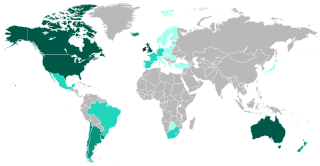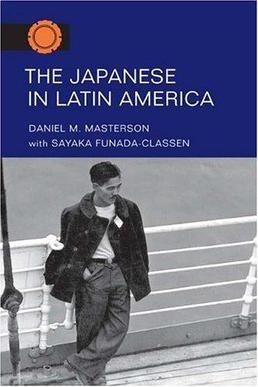This article needs additional citations for verification .(June 2023) |
The Society for Irish Latin American Studies (SILAS) was created in 2003 to study Ireland's role in Latin America.
This article needs additional citations for verification .(June 2023) |
The Society for Irish Latin American Studies (SILAS) was created in 2003 to study Ireland's role in Latin America.
It was founded on 1 July 2003 to promote the study of relations between Ireland and Latin American countries. SILAS's range of interest includes the settlement, lives, and achievements of Irish emigrants to Latin America and their descendants, as well as the contemporary presence of Ireland in the life and culture of Latin America and the presence of Latin Americans in Ireland.
SILAS was originally established as the "Irish Argentine Historical Society", with a principal focus on the different aspects of Irish emigration to Argentina, and the development of the Irish-Argentine community. In order to reflect the members' interest in other Latin American countries and regions, in 2005 the organisation's name was changed to Society for Irish Latin American Studies.
The first undertaking of SILAS was the publication of Irish Migration Studies in Latin America open-access journal. Other SILAS activities include research projects, publishing of studies and essays, funding of fellowships, grants and research prizes, organisation of field trips, educational programmes and conferences, and involvement in restoration and museum projects. Announcements are regularly published through the web site. The Society is open to any discipline, to any historical period, and to any methodological approach. SILAS is a non-profit international organisation incorporated in Geneva under the Swiss laws.

Irish people are an ethnic group and nation native to the island of Ireland, who share a common history and culture. There have been humans in Ireland for about 33,000 years, and it has been continually inhabited for more than 10,000 years. For most of Ireland's recorded history, the Irish have been primarily a Gaelic people. From the 9th century, small numbers of Vikings settled in Ireland, becoming the Norse-Gaels. Anglo-Normans also conquered parts of Ireland in the 12th century, while England's 16th/17th century conquest and colonisation of Ireland brought many English and Lowland Scots to parts of the island, especially the north. Today, Ireland is made up of the Republic of Ireland and Northern Ireland. The people of Northern Ireland hold various national identities including British, Irish, Northern Irish or some combination thereof.
Development studies is an interdisciplinary branch of social science. Development studies is offered as a specialized master's degree in a number of reputed universities around the world. It has grown in popularity as a subject of study since the early 1990s, and has been most widely taught and researched in developing countries and countries with a colonial history, such as the UK, where the discipline originated. Students of development studies often choose careers in international organisations such as the United Nations, World Bank, non-governmental organisations (NGOs), media and journalism houses, private sector development consultancy firms, corporate social responsibility (CSR) bodies and research centers.

With nearly 250,000 Buddhists, Brazil is home to the third-largest Buddhist population in the Americas, after the United States and Canada. Buddhism in Brazil consists of practitioners from various Buddhist traditions and schools. A number of Buddhist organisations and groups are also active in Brazil, with nearly 150 temples spread across the states.
The International Psychoanalytical Association (IPA) is an association including 12,000 psychoanalysts as members and works with 70 constituent organizations. It was founded in 1910 by Sigmund Freud, from an idea proposed by Sándor Ferenczi.
The Institute of Historical Research (IHR) is a British educational organisation providing resources and training for historical researchers. It is part of the School of Advanced Study in the University of London and is located at Senate House. The institute was founded in 1921 by A. F. Pollard.

Immigration to Mexico has been important in shaping the country's demographics. Since the early 16th century, with the arrival of the Spanish, Mexico has received immigrants from Europe, Africa, the Americas, and Asia. Today, millions of their descendants still live in Mexico and can be found working in different professions and industries.
Edmundo Murray, is an Argentine author, born in a family of mixed Colombian, Irish and Swiss roots. He has published widely on Irish-Latin American relations, art and diplomacy, and links between food and music.
The International Institute for Environment and Development (IIED) is an independent policy research institute whose stated mission is to "build a fairer, more sustainable world, using evidence, action and influence in partnership with others." Its director is Dr Tom Mitchell.

Local history is the study of history in a geographically local context, often concentrating on a relatively small local community. It incorporates cultural and social aspects of history. Local history is not merely national history writ small but a study of past events in a given geographical area which is based on a wide variety of documentary evidence and placed in a comparative context that is both regional and national. Historic plaques are one form of documentation of significant occurrences in the past and oral histories are another.
Colombians in the United Kingdom include British citizens or residents who are of Colombian ancestry. According to the 2011 UK Census, the Colombian-born population of England was 25,016, Wales 166, Scotland 507 and Northern Ireland 72.

Foreign relations between the Argentine Republic and People's Republic of China has existed for decades. Both countries established diplomatic relations in 1945 as the Republic of China and again on March 19, 1972, with the PRC.
Tanzanians in the United Kingdom are citizens or residents of the United Kingdom whose ethnic or national origins lie fully or partially in Tanzania. The Tanzanian community in the UK is the largest of any OECD nation and is ethnically diverse, consisting of indigenous Black Africans alongside thousands of East African Asians who fled from violence during the Zanzibar Revolution.
The Magdalena Project is an international network of women in contemporary theatre and performance. It aims to increase awareness of women's contributions to theatre and to create the artistic and economic structures and support networks to enable women to work.
The English people are an ethnic group and nation native to England, who speak the English language, a West Germanic language, and share a common history and culture. The English identity began with the Anglo-Saxons, when they were known as the Angelcynn, meaning race or tribe of the Angles. Their ethnonym is derived from the Angles, one of the Germanic peoples who migrated to Great Britain around the 5th century AD.

Non-Hispanic Whites, Non-Latino Whites, or more simply Whites, are Americans classified by the United States census as "white" and are not of Hispanic ethnicity. According to the United States Census Bureau yearly estimates, as of July 1, 2022, Non-Hispanic whites make up about 59.3% of America's population, or 197,639,521 people. The United States Census Bureau defines white to include European Americans, Middle Eastern Americans, and North African Americans. Americans of European ancestry are divided into various ethnic groups. More than half of the white population are German, Irish, English, Italian, French and Polish Americans. Many Americans are also the product of other European groups that migrated to parts of the US in the 19th and 20th centuries, as the bulk of immigrants from various countries in Northern, Central, Eastern, and Southeastern Europe, as well as the Caucasus region, migrated to the United States.

The Revenue Society was formed in 1990 and is the only international philatelic society which covers revenue stamps of the whole world. The society is also noted for the particularly high quality of its journal which has published many articles on subjects about which little or nothing has previously been written.
Despite significant progress, education remains a challenge in Latin America. The region has made great progress in educational coverage; almost all children attend primary school and access to secondary education has increased considerably. Children complete on average two more years of schooling than their parents' generation. Most educational systems in the region have implemented various types of administrative and institutional reforms that have enabled reach for places and communities that had no access to education services in the early 90s.

Sino-Latin America relations are relations between China — which is by defined as either the People's Republic of China or the Republic of China — and the countries of Latin America. Such relations have become increasingly important between the region and Latin America.

The Great European Immigration Wave to Argentina was a major source of economic growth and social change for Argentina. Beginning in the late 19th century, the wave consisted largely of Italian and Spanish immigrants, though it did include other nationalities and ethnic groups most notably a large Slavic and Jewish population. The rapid influx of European migrants led to immense population growth in Argentina, and the migrants were incredibly influential in the politics of the nation by introducing political concepts like labor unions and socialism into the country’s political zeitgeist. The remnants of the Immigration Wave of migrants are still visible in Argentina today, not only as a result of their influence on the country’s economic and political history, but as cultural cornerstones in both urban and rural communities alike. Shifting labor markets and decreased reliance on European economics after the outbreak of World War I had a huge effect on European Migration to Argentina. These factors all lead to the end of the Great European Immigration Wave and began an era of Latin American politics primarily focused on domestic growth rather than the outsourcing of international labor.

The Japanese in Latin America is a 2004 book published by the University of Illinois Press about Japanese Latin Americans. The author is Daniel Masterson, while Sayaka Funada-Classen gave research assistance related to the Japanese language. The book discusses all of the major Japanese populations in Latin America and some other groups of Japanese diaspora who are not as well known. The Japanese populations of Argentina, Bolivia, Brazil, Chile, Colombia, Paraguay, Peru and Uruguay in South America, Cuba and the Dominican Republic in the Caribbean, Central America, and Mexico are all discussed in this book.